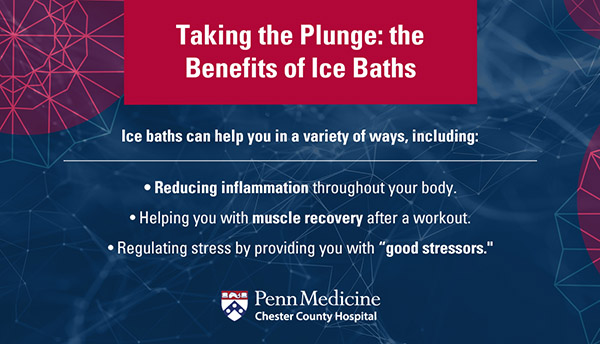
Ice baths have gained popularity among athletes and fitness enthusiasts in recent years as a way to aid in post-exercise recovery and enhance overall fitness performance. From social media TV shows featuring celebrities interviewing each other while in ice baths to viral vlogs showcasing everyday people participating in daily ice plunges, ice baths have become the next big thing that more and more people are giving a try.
But are ice baths suitable for everyone? And if not, who should be taking them?

Taking the Plunge: the Benefits of Ice Baths
Ice baths can help you in a variety of ways, including:
- Reducing inflammation throughout your body
- Helping you with muscle recovery after a workout
- Regulating stress by providing you with "good stressors"
What Are Ice Baths?
An ice bath, also known as cold-water immersion therapy, involves submerging the body into ice-cold water for a specific duration, usually between 10 to 20 minutes. Studies have shown that ice bathing and exposure to cold air can be effective in the treatment of chronic autoimmune inflammation, can provide a positive effect on stress regulation, and more.
Additionally, some studies suggest that people who participate in cold-water immersion through routine ice bathing may reduce other cardiovascular risks. On the contrary, other studies have provided evidence that prolonged cold-water immersion could potentially lead to heart muscle damage. When considering if you can and should participate in this trend, it’s important to weigh all the medical pros and cons.
Who Might Benefit From Ice Baths?
Understanding that there are risks, it’s especially important to know who might benefit from ice baths to determine where you fit in. Some people who may find cold-water immersion helpful include:
- Athletes: Ice baths are commonly used by athletes, especially after intense training sessions or competitions. Studies have shown that cold-water immersion therapy reduces post-exercise muscle stiffness while helping to eliminate fatigue and decreasing muscle damage caused from the exertion. They have also provided evidence that ice baths can improve overall athletic performance and allow athletes to accomplish more work in subsequent exercises after cold-water immersion therapy.
- Recreational Exercisers: Individuals who engage in regular exercise routines, such as jogging, cycling, or weightlifting, may also benefit from occasional ice baths. Like athletes, they can use ice baths to alleviate muscle soreness and accelerate recovery between workouts, if they do so with caution.
- Those Seeking Stress Relief: "Some individuals use ice baths as a form of stress relief or relaxation," says Greg Speca, PT, DPT, Lead Physical Therapist, Chester County Hospital.
"Cold exposure can cause the body to produce "good stressors", helping you to regulate between the good and bad stress of life. This increase in stress regulation decreases the body’s sensitivity to stress and increases stress tolerance.” Additionally, cold therapy can produce a feeling of calm, happiness, and well-being , which can lower your overall anxiety and provide stress relief.
Who Should Approach With Caution When It Comes to Ice Baths?
While taking ice baths may have its perks that make it tempting to try, it comes with risks as well. Before plunging in, consider that it might not be the best option for the following people:
- Children and Adolescents: Ice baths may not be suitable for children and adolescents, especially without supervision. Their smaller bodies may not regulate temperature as effectively as adults. Parents should consult with a pediatrician before allowing their children to use ice baths.
- Elderly Individuals: Older adults may have underlying health conditions or reduced circulation, which can make them more vulnerable to the effects of cold exposure. Elderly individuals should exercise caution and consult with a healthcare professional before trying ice baths.
- Individuals With Certain Medical Conditions: People who have specific illnesses, such as heart problems like cardiovascular disease, should avoid ice baths or use them under medical supervision. Cold exposure can exacerbate symptoms or complications associated with these conditions .
As with any new diet, exercise routine, or post-workout recovery option, it’s important to consider your body and personal health journey before diving in. Consult with a doctor to discuss your individual health status and decide what works for you. When used safely and appropriately, ice baths can be a valuable tool in promoting recovery and overall well-being.
Get The Cold, Hard Facts on Pain and Injury Relief
Physical injuries and chronic conditions should not automatically banish you to a life of pain or physical limitation. Our customized treatment programs guide patients on the safest and quickest path to rehabilitation, pain management, and recovery. Learn how one of our therapists may be able to help you.